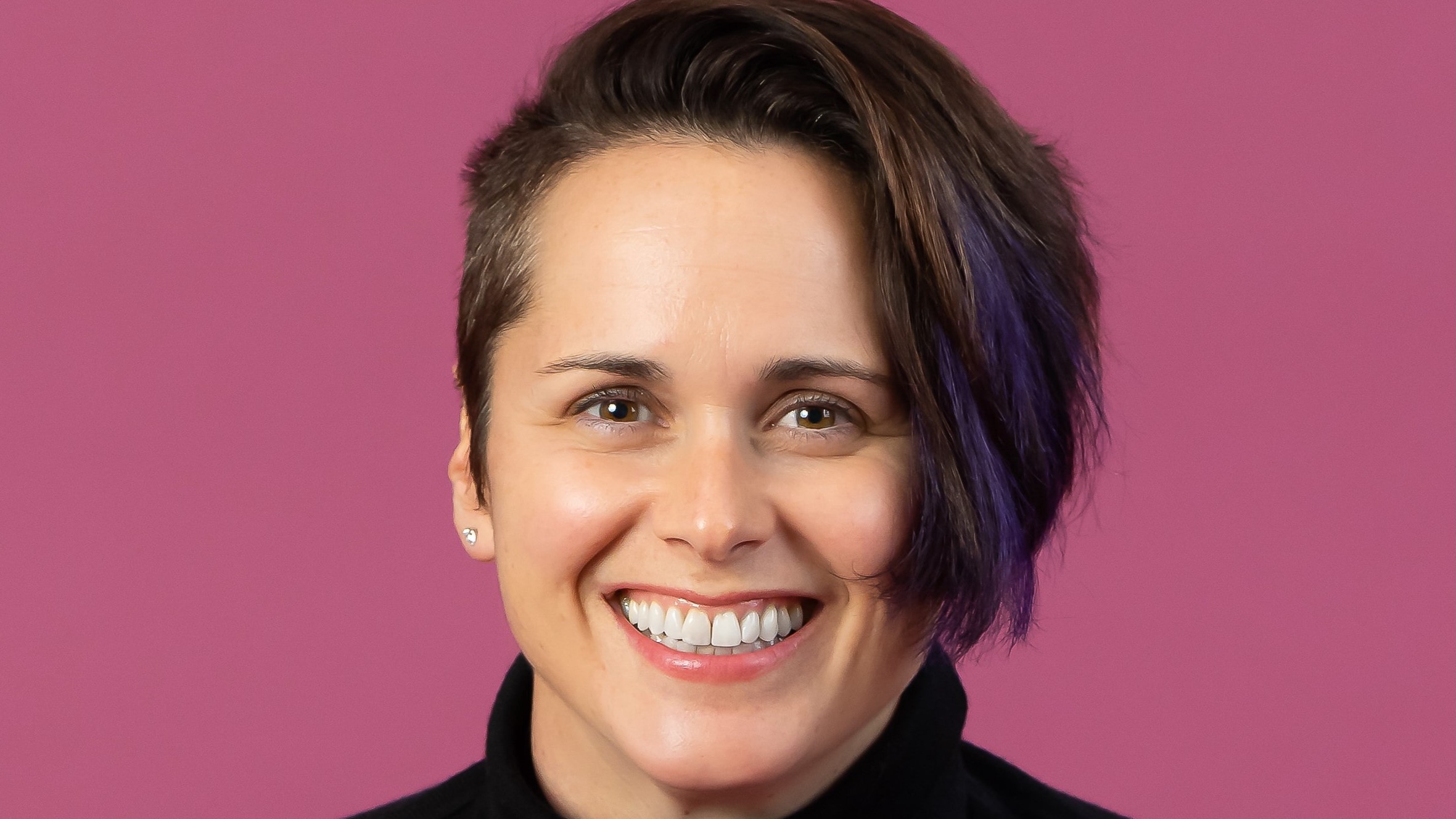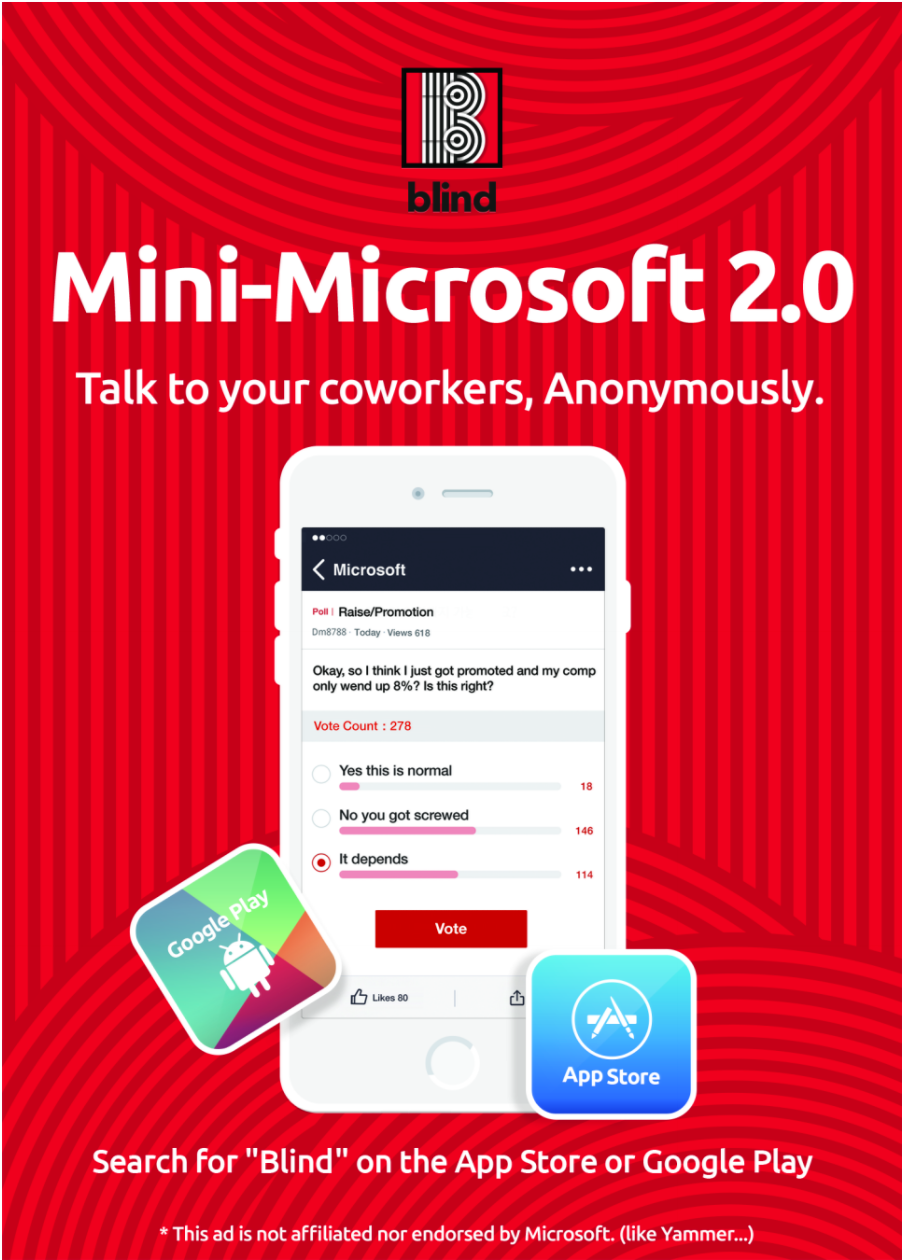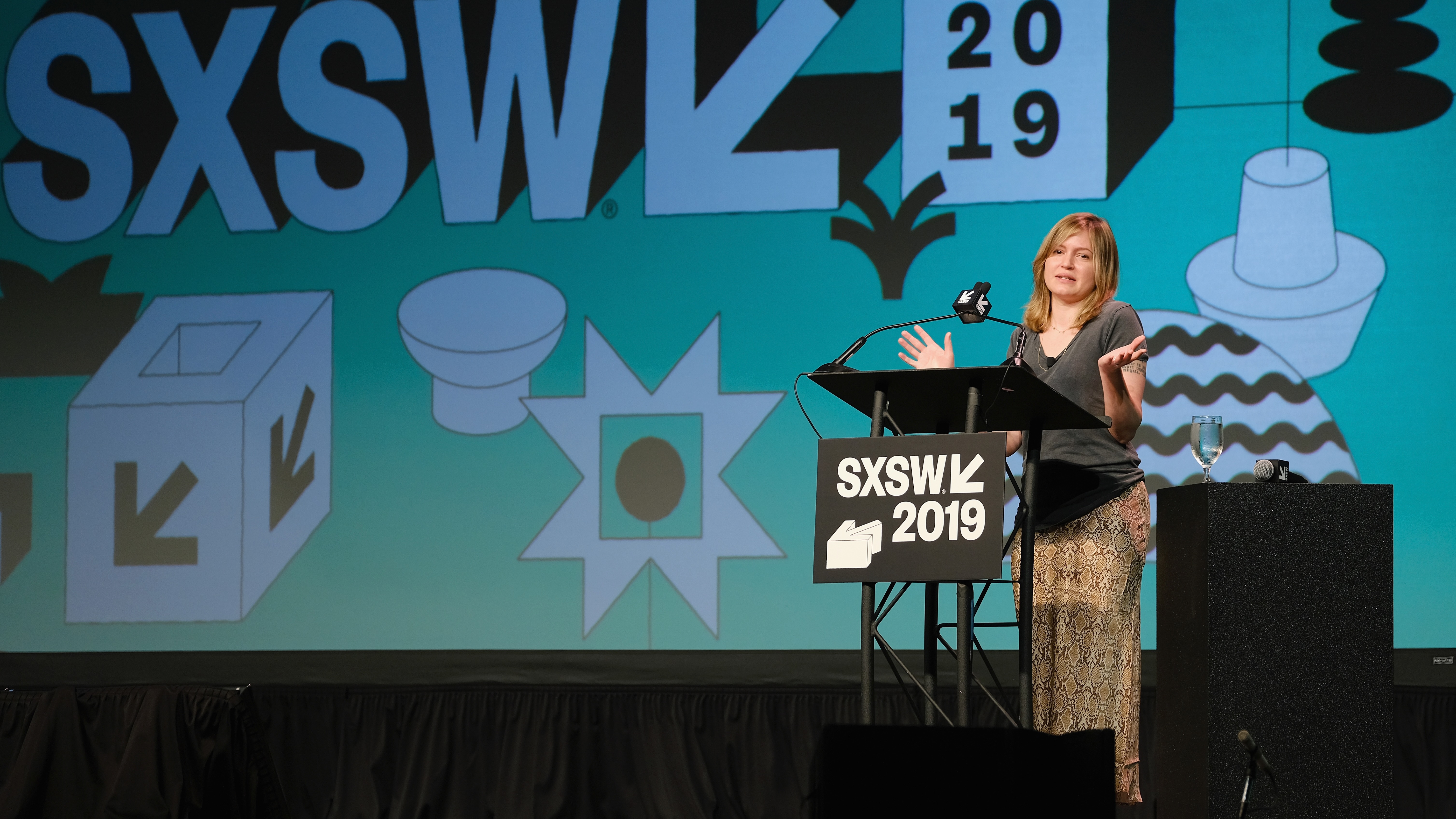
 Art by Clark Miller
Art by Clark MillerHow Blind Became the App Silicon Valley Bosses Love to Hate
Tech execs despise it. The industry's rank-and-file are addicted to it. Blind has become something like a Reddit for workplaces, mixing anonymous nastiness with layoff leaks, confessions about compensation and a bonanza of corporate gossip.
Alex Shin was pretty sure he’d just screwed up the deal.
It was early 2021, and Shin was pitching a couple of investors from the venture capital arm of Cisco Systems on the idea of investing in Blind—an app used by millions of workers at tech companies and employers to anonymously gossip about compensation, the horrors of dating in San Francisco and everything in between. Shin, an adviser for Blind at the time, told the Cisco folks about a new product from the company, a sentiment analysis tool for measuring the unvarnished opinions of employees about their workplaces.
Shin was proud of the tool, which calculated a score for employers on a five-star scale based on ratings from their workers. But then the investors, whom he was pitching on a video call, asked to see Cisco’s score. Shin didn’t want to show it to them. Cisco had a lowly 2.5 stars due to complaints from employees. The Cisco investors insisted.
“We showed them the data and the Zoom meeting got real quiet,” said Shin. “And then the investors were like, ‘Well, that’s pretty accurate. We’re in.’”
A Cisco spokesperson didn’t respond to a request for comment. The company currently has 3.7 stars on Blind.
If LinkedIn is where Silicon Valley’s ego goes to humble brag, Blind is where its id goes to vent. Employees light up its bulletin boards with complaints about return-to-office plans they regard as boneheaded. They debate who is the most “alpha” CEO in tech and boast about their comp packages. Some expose their mistreatment at the hands of bad bosses, while others settle scores with colleagues they perceive as underperforming.
Earlier this year, for example, Apple employees participated in a poll on Blind that asked a blunt question: “Should we just fire all of Siri?” More than three-quarters of respondents, close to 300 people, had answered yes as of the middle of March, according to a screenshot of the poll viewed by The Information.
Sure, nearly all of the nastiness on Blind is anonymous. So is the content on a lot of other upstart social media apps that eventually flamed out (anyone remember Secret?). But Blind, so far, has managed to stay relevant longer than any of them, even more so in an era of regular layoffs in the tech industry.
A big part of what sets it apart is that Blind’s users aren’t just randos on the internet. Before allowing them to post anything, Blind verifies its users’ place of employment by requiring them to provide a corporate email address when they sign up. They can then post in Blind’s public forums—the app shows where they work—or in more private forums where only people employed by the same company can post. Some of the juiciest gossip, including leaks about impending layoffs and a wealth of detailed compensation data, turns up in those private forums.
The result is an app that has infuriated the tech industry’s managerial class. One normally outspoken CEO of a publicly traded technology company, who would only discuss the app anonymously because he feared a backlash from his own employees on Blind, views it as a toxic cesspool of complainers.
“Universally, it’s completely disliked,” said the CEO, who did not acknowledge the irony in anonymously bashing an app notorious for anonymous bashing of tech CEOs. “I cannot find a redeeming quality about Blind. I don’t know of any founder or CEO who would say a good thing about it.”
Glenn Kelman, CEO of online real estate broker Redfin, has his own strategy for dealing with Blind: Avoid it altogether. “I am too old, insecure and self-important to visit Blind,” said Kelman. “But as long as the internet has existed, anonymous message boards have existed. They are places of pure misery.”
Still, Kelman said there’s a paradox in apps like Blind. “Anonymity lets us slander one another without consequences, but it’s also the only way to speak truth to power,” he said.

The Blind hate is far from universal in tech, though, despite what some tech leaders assert.
Some techies see Blind as one of the best ways to tap into the industry’s zeitgeist—for example, exploring trends in compensation, a perennial hot topic on the app’s discussion forums. Two years ago, Amanda Richardson—CEO of CoderPad, which makes a product that lets employers assess the technical skills of programmers—recalls seeing a Blind post from a programmer early in their career that showed how wacky pay was getting in the industry. The programmer said they had received an offer of $900,000 in total annual compensation from Coinbase.
“There was a debate about if that was a sufficient offer,” Richardson said of the Blind discussion on the programmer’s post. “I live in San Francisco, but $900,000 a year? What?”
She said of the posts she sees on Blind, “I would say it’s 60% junk food and 40% understanding psychology in tech.”

Blind says it currently has about 12 million active monthly users globally. While that’s a relative pittance compared to megaplatforms like Instagram and Snap, Blind’s power comes from its penetration at the most powerful companies in tech. As of July, it counts among its users nearly 135,000 current Microsoft employees, equal to about 60% of that company’s global headcount, as well as 80,000 from Google (43%), 70,000 from Meta Platforms (over 90%) and 33,000 from Apple (20%), according to Blind.
Some tech employers have tried to make it harder to reach those employees. In Blind’s early years, some employers tweaked their corporate networks to prevent access to the app. None of the tactics worked for very long, one of Blind’s co-founders, Kyum Kim, said in an interview.
“If they block our emails, we can change our emails. If they block us on Wi-Fi, everyone has mobile data,” chuckled Kim, who is Blind’s chief business officer. “It actually works as a promotion for us because people start talking about, ‘Hey, they blocked Blind! What is that? I didn’t know about it.’ And then we actually get more users.”
Kim defends the app’s commitment to anonymity and advises CEOs and human resources teams at companies that reach out to him that they should take the feedback of their employees on Blind seriously. “What's being said on Blind is likely being said in other places, like over beers, social media, or their internal pulse surveys,” he said.
Now, Blind is trying to turn its grassroots presence inside corporate workplaces into a viable business.
In recent years, the still-unprofitable company has launched an array of new products it hopes will generate revenue, including Talent by Blind, an internal recruiting agency of sorts that connects tech workers with open roles at top companies (current clients: BlackRock, Kleiner Perkins, Ramp and StubHub). It also offers Insights by Blind, which helps curious execs and human resources professionals better understand their company’s reputation among techies by surveying users and analyzing discussions on Blind (Gopuff, Roblox and Salesforce use it).

To fund its efforts, the company has raised a total of $62 million from investors—including Cisco, DCM Ventures and SoftBank Ventures Asia—and built out a global staff of 200 employees. But Blind will still have to win over the bosses it has spent the better part of a decade pissing off. Kim, for one, is confident the company can do it.
“It’s almost like stages of grief,” said Kim. “First you’re kind of scared, so you try to shut it down, and then you give up on shutting it down because you realize that it’s here to stay, and then, eventually you start accepting it as one of your resources.”
The deck was stacked against Blind from the beginning. It didn’t emerge from some flashy tech incubator in San Francisco or a dorm room at Stanford University, but rather from a group of tech workers in South Korea, who founded it in 2013.
Sunguk Moon, Blind’s CEO, came up with the idea for the platform while working at Korean search giant Naver in the late 2000s, when the company operated an anonymous discussion forum for its own employees. Moon was fascinated by the tenor of the discussions on the internal message board. The anonymity seemed to embolden his colleagues, freeing them from some of the social pressures of Korea’s hierarchical conglomerates, known as chaebols. Naver soon shut the message board down.
“They didn’t like those discussions happening,” recalled Kim. “What he learned by seeing that is [that] in order for these anonymous channels to be independent and effective, they need to be disconnected from company affiliation. There needs to be an independent third-party overseeing them.”
Blind became that third party. As a result, it quickly took off in Korea as a place for corporate workers—identified only by an anonymous username and the company they worked for—to discuss everything from their dating woes to alleged discrimination at Hyundai, Samsung and other employers.
In 2014, Blind reaped a bonanza of free publicity after a series of posts by Korean Air Lines employees detailed how a vice president of the company had flown into a “nut rage” on a flight to Seoul: When served macadamia nuts in a paper bag rather than on a plate, the executive, Cho Hyun-ah, forced the plane to return to the gate. The posts went viral, resulting in global media coverage, and the executive, who was also the daughter of the airline’s chair was ultimately sentenced to 12 months in prison.

Blind’s success in South Korea convinced the startup’s founders it was time to test its appeal on a bigger stage. In early 2015, with about a million dollars in seed funding in their pockets, the Blind team set off for California. They launched a U.S. version of the app in March.
It was a bad time for Blind to hang a shingle in Silicon Valley. A new breed of anonymous discussion apps had developed a poisonous reputation. One such app, Secret, had exploded in popularity among techies in 2014 and quickly became a hotbed of harassment, negativity and racism. It shut down shortly after Blind arrived in California, which didn’t help the app, said Shin, who joined Blind in 2015 to help it transition to the U.S. market.
‘I cannot find a redeeming quality about Blind. I don’t know of any founder or CEO who would say a good thing about it.’
In California, the Blind team also struggled to replicate the marketing techniques that had been so successful in South Korea. In the app’s home country, the co-founders had relied on word of mouth and a robust network of friends and former colleagues to introduce new users to Blind, one company at a time.
But Kim and his co-founders found it difficult to connect with workers in Silicon Valley, in part because they had a hard time finding places to meet a large number of employees from the same company. Tech employers offered so many attractive perks, such as free meals, he said, that people didn’t leave their campuses.
Instead, the co-founders and Shin decided to head north in mid-2015 to another tech hot spot, Seattle, where they hoped to recruit employees at Amazon—a company that offered skimpier perks than its Silicon Valley counterparts—to use Blind.
The Blind team rented an apartment close to Amazon’s campus and “spent three months just partying with Amazonians, buying them shots” and pitching them on the idea of using Blind, said Shin. On its own, that approach had middling results—a fair number of Amazonians already knew what Blind was, but not many of them were using it, said Shin, who stopped working for Blind full time in 2019 but has continued to advise the team on certain matters, like the 2021 fundraising process.
That changed a few months after the Blind team arrived in Seattle, when The New York Times published an exposé highlighting the company’s punishing corporate culture. The story was rife with juicy details, including Amazonians’ penchant for crying at their desks. After the story was published, Blind saw a surge of new sign-ups from Amazon employees.
“It blew up our app,” said Shin.
While Amazon mounted a full-throated defense of its workplace culture in the press and in blog posts, many Amazonians on Blind recognized the truth in the story, said Shin. “All the Amazon people publicly were like, ‘No, Amazon’s a great place to work,’” recalled Shin. “But on Blind, everybody’s like, ‘Yeah, dude, a grown man was crying at his desk this morning.’”
Around the same time, Blind pulled a guerrilla marketing stunt in nearby Redmond, Wash., at Microsoft—the area’s other big tech employer. In the dead of night, Kim roamed around Microsoft’s campus, putting up bright red posters advertising Blind as a new way to talk anonymously to co-workers. Shin kept an eye out for security guards.

“Kyum was skinnier and a little faster than me, so I would drive and he would stick the posters,” Shin said. “We got really good at timing it.”
The posters themselves were a bit of a deep cut. They described Blind as “Mini-Microsoft 2.0,” a reference to a then well-known anonymous blog that chronicled employee discontent at the company. Mini-Microsoft featured a forum where Microsoft employees traded war stories about the workplace.
Microsoft employees began signing up for Blind by the dozens, then the hundreds.
Having conquered Seattle, the Blind team headed back to the San Francisco Bay Area in late 2015 for a do-over. This time, it worked.
They set up shop in Berkeley and began rolling out new company-specific private forums and inviting employees to participate.
It was the beginning of a turbulent time in the Valley. A string of scandals, cutbacks and workplace eruptions constantly sent new crops of employees running to Blind to discuss events. In early 2016, Yahoo employees took to the app to share rumors about CEO Marissa Mayer’s soon-to-be announced plans to lay off 15% of staff. At Google in 2017, employees flocked to the app after an anti-diversity memo penned by software engineer James Damore went viral.
After a former Uber engineer, Susan Fowler, penned an explosive blog post in 2017 about being the target of sexual harassment at the company, Uber employees turned to the app to discuss cultural issues and the response from leadership. “When that happened, Uber employees were spending hours every single day on Blind,” recalled Kim. “The company wouldn’t give them enough information and they wanted to know what’s going on, but they couldn’t just raise their hand and ask, whereas when they came to Blind, it was safe to bring up those questions.”
As Blind gathered steam, more employers began taking measures to keep their staff from using it, citing concerns about the leaking of confidential information or a general animosity toward the site.
In 2017, in the wake of Fowler’s post, Uber blocked its employees’ access to Blind from its corporate network, Business Insider reported at the time. Tesla and others have gone a step further and blocked inbound account verification emails from Blind in an attempt to stop employees from signing up for an account in the first place, Kim said.

Some tech leaders have used more unorthodox methods to neutralize the discussions about their companies on Blind.
In late 2021, Better.com CEO Vishal Garg was the subject of unflattering headlines after he laid off 900 employees of the startup in a brief Zoom meeting. Days later, a Better.com employee who went by the username Uneducated began pushing back on Blind posts by Better.com workers who expressed frustration over how Garg had handled the layoffs. Uneducated called the disgruntled employees “ingrates” and suggested that they “quit and go elsewhere if you are this unhappy with senior management.” Some of the laid-off employees had been “stealing” from the company by working fewer hours than expected, the user claimed.
The person behind the Uneducated username on Blind was Garg himself, he later admitted to Fortune magazine, after rumors began swirling among employees on Blind that the user’s writing style appeared eerily similar to Garg’s. Garg didn’t respond to a request for comment.
The news leaks and freewheeling discussions by tech employees on Blind have continued.
In April, an Amazon employee’s post about a colleague who resigned in response to the company’s new return-to-office policy garnered upward of 1,600 comments and 117,000 views. Employees from Microsoft to Meta to Qualcomm sparred in the replies over the environmental and cultural benefits of remote work, and the question of whether tech workers had grown too entitled during the pandemic break from office life.
In early June, Blind saw an “extraordinary” number of current employees of Sumo Logic, a data analytics startup, create accounts, said Rick Chen, a spokesperson for Blind. Soon some of them began posting about an ongoing round of layoffs that was tanking morale at Sumo. Days later, The Information reported that the company had indeed announced widespread layoffs.
And there is still a lot of offensive, catty and downright juvenile material on Blind. One recent poll asked Blind users to vote on whether the CEO of a major tech company was a “cuck”—an expression right-wing users commonly employ on the internet to describe a man they perceive as weak or one who has progressive political views.
That’s the same kind of crass discourse often found on largely anonymous bulletin boards like Reddit. Blind’s leaders, it turns out, see Reddit as a model, at least in some ways.
Kim says traditional internet review systems—whether for products on Amazon or workplaces on sites like Glassdoor—once had their place. But there are flaws in those systems. Reviews can be gamed by employers, merchants or even competitors, especially if the platforms don’t strictly limit who can post reviews (Glassdoor, for example, allows reviews of employers from people who say they’ve worked at the company in the last five years).
Now, when he’s looking for the most authentic user reviews of products, says Kim, he goes to Reddit. He argues that Blind fills the same role for workplaces.
“It’s the…purest form of content that is driven by real users of products,” said Kim. “I think for work, the same thing is happening.”
Paris Martineau (@parismartineau) is a feature writer and investigative reporter for The Information's Weekend section. Have a tip? Using a non-work device, contact her via Signal at +1 (267) 797-8655.